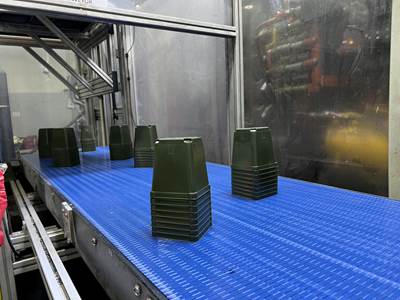Your Business Outlook - May 2002
Resin consumption for injection-molded toys in the U.S. decreased by 33% from 1997 through 2001.
Resin consumption for injection-molded toys in the U.S. decreased by 33% from 1997 through 2001. Many manufacturers, such as Hasbro, Lego Systems, and Tyco Toys (owned by Mattel) have moved either all or part of their production to Mexico, China, or Taiwan, where labor costs are lower. As a result, approximately 85% of toys sold in the U.S. are partially or wholly manufactured outside this country. The accompanying chart shows a consequent drop of over 100 million lb in domestic annual resin consumption.
There are still many companies that participate in the U.S. and Canadian toy-making industry, but the four biggest producers (Fisher-Price, Inc., Ritvik Toy Corp., Little Tykes Co., and American Plastic Toys) accounted for 67% of the domestic injection-molded toy market in 2001.
Mastio & Company’s newest injection molding market study shows little growth in this market during 2001. Though business overall was flat, some niche processors experienced substantial growth. Those processors specialize in a particular kind of toy, such as building-block types (e.g., Lego or Ritvik), which have been a strong market sector lately. Mastio & Company is forecasting 2.5% growth in 2002. The current projection is for an increase of over 30 million lb by 2006. This reflects gradual increases in domestic production, now that the migration to offshore production has largely been accomplished.
The U.S. is still the largest market for toys in the world, and there are still opportunities in toys for molders offering rapid production cycles, substantial help during the design and testing phase, and some technological know-how, such as assembly. The toy market will continue to grow in line with consumer spending, but imports will remain a fact of life and domestic growth will be modest except for niche offerings.
Where the growth is
The injection-molded toy market is greatly influenced by the latest eye-catching design, innovative line extensions, creative marketing, in-store exposure, availability, positive word-of-mouth, and perceived value—not to mention the overall health of the economy. There is an enormous interest in new items that reflect the latest technological advances or have become part of a fad. The market is still influenced by the season of the year, but not as much as it was in the past. Many toy categories perform well all year round.
More traditional toys are expected to increase in popularity throughout 2002. For example, rescue-hero “action figures” are very popular since the Sept. 11 terrorist attacks on New York and Washington. One of these making a comeback is Hasbro’s G.I. Joe.
Also doing well are large backyard or playground toys and swing sets. This is due to more people choosing to stay closer to home rather than traveling. This could be a year-round trend.
Electronic toys and games are going to be very popular. This technological trend has caught the market by storm. There is now an ample supply of electronic chips for toys. In the past few years, a chip shortage was spawned by the advent of business-related gadgets such as the Palm Pilot. The toy market suffered as a result. Now, since there is a slump in business electronics, chips for toys are more available. Other toys with growth potential are educational toys—electronic products that help teach kids to read, spell, and pronounce words.
On the flip side, some injection-molded toys are experiencing a serious decline in consumer demand. For example, “beastly”-type action figures are less popular. These products usually do well, but have not since Sept. 11.
Mainly commodity resins
Toys are most typically produced from HDPE and polypropylene resins. However, polystyrene and LDPE are also utilized in considerable amounts. HDPE is the most common material used in this market, representing a 33% market share. HDPE offers good durability, high strength, excellent stiffness, high flow, and good impact resistance. PP offers high impact, good flexural modulus, and stiffness. LDPE is commonly used where softness, toughness, and flexibility are important.
Mastio & Company, based in St. Joseph, Mo., is a well-known consulting firm specializing in industrial-consumer opinion research and market trends in the plastics industry. For more information, call (816) 364-6200 or visit www.mastio.com/pt/outlook.html.
Read Next
Processor Turns to AI to Help Keep Machines Humming
At captive processor McConkey, a new generation of artificial intelligence models, highlighted by ChatGPT, is helping it wade through the shortage of skilled labor and keep its production lines churning out good parts.
Read MoreAdvanced Recycling: Beyond Pyrolysis
Consumer-product brand owners increasingly see advanced chemical recycling as a necessary complement to mechanical recycling if they are to meet ambitious goals for a circular economy in the next decade. Dozens of technology providers are developing new technologies to overcome the limitations of existing pyrolysis methods and to commercialize various alternative approaches to chemical recycling of plastics.
Read MoreHow Polymer Melts in Single-Screw Extruders
Understanding how polymer melts in a single-screw extruder could help you optimize your screw design to eliminate defect-causing solid polymer fragments.
Read More






.png;maxWidth=300;quality=90)














